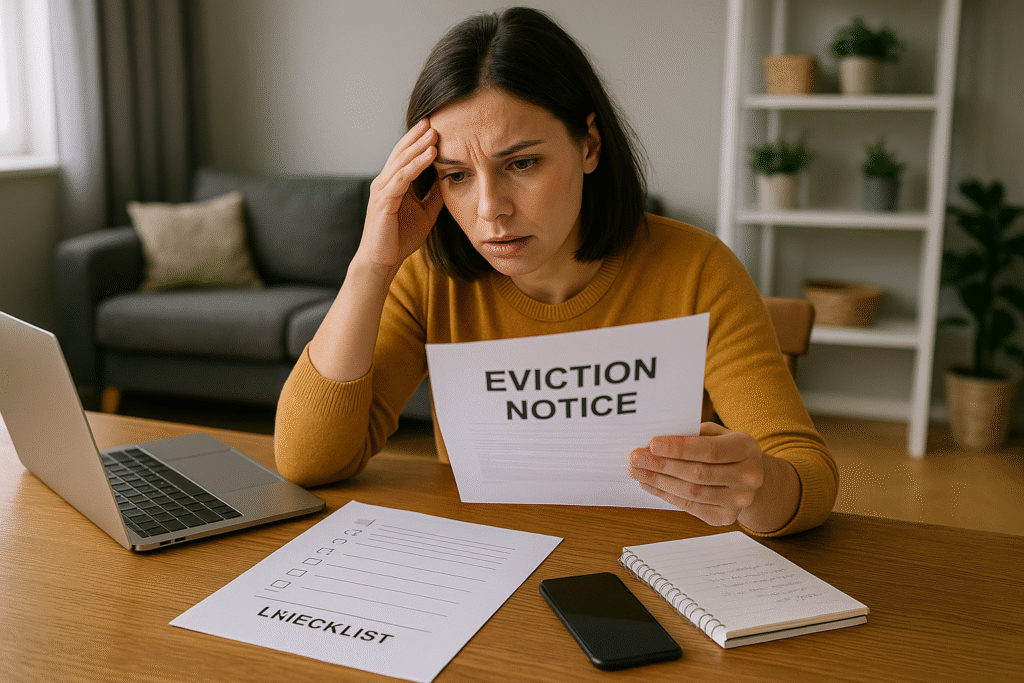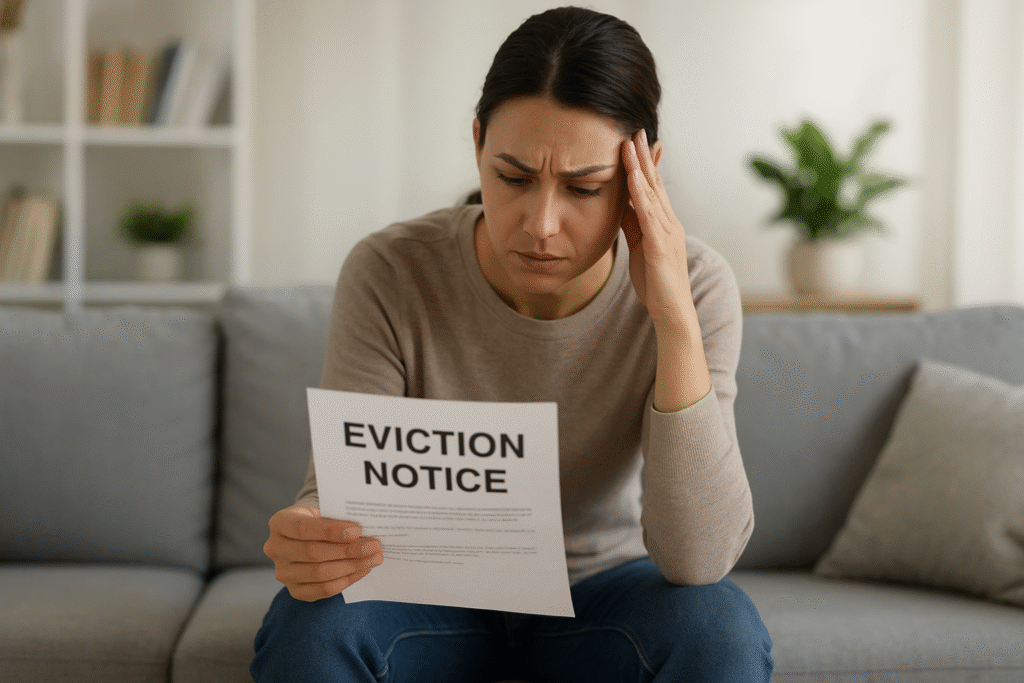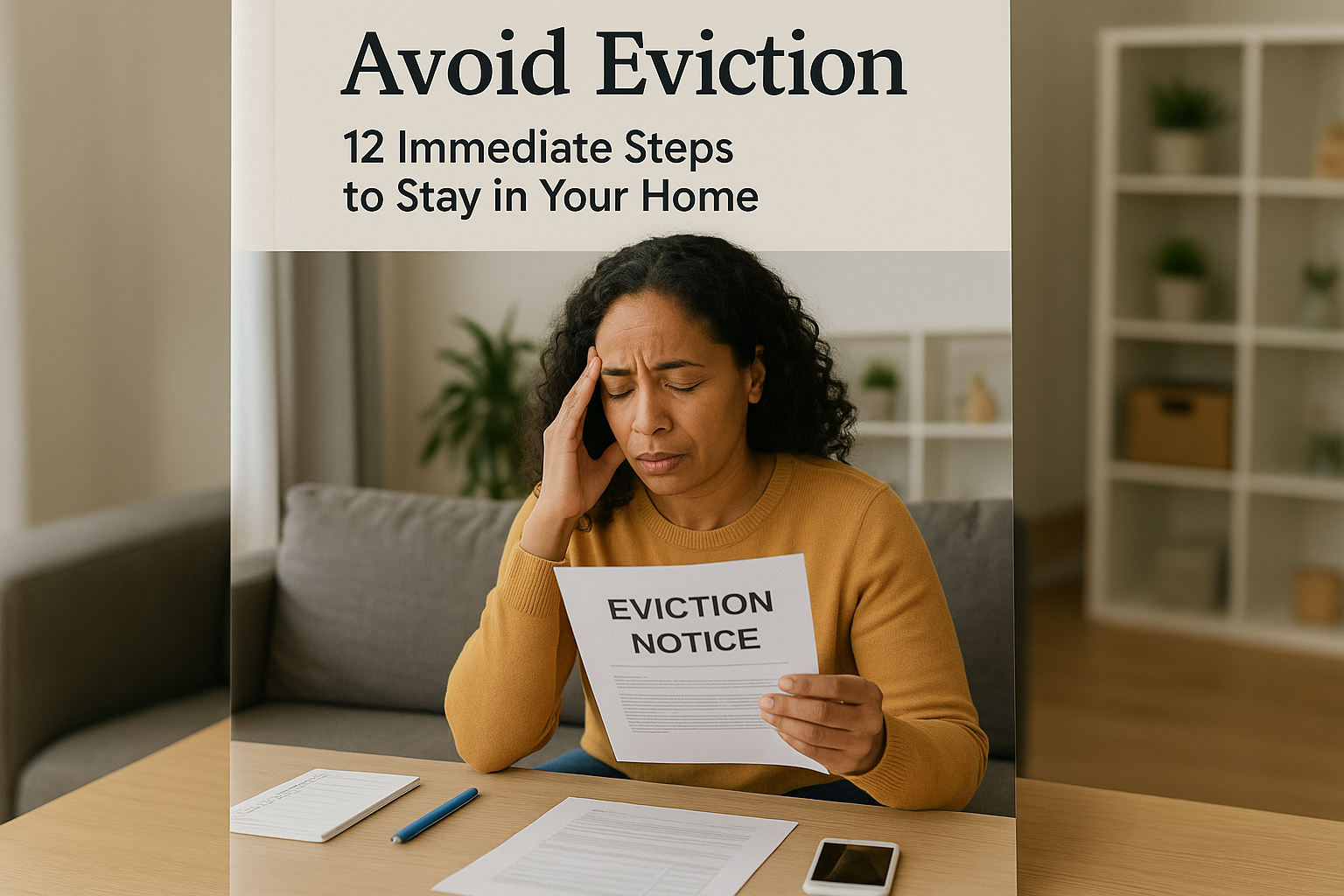Avoid Eviction: Facing an eviction is scary — but there are clear steps you can take right now to protect yourself, get help, and possibly stop the eviction entirely. This friendly, action-oriented guide walks you through what to do the moment you get a demand for payment, an eviction notice, or a court summons. It includes checklists, sample language to use when you call for help, and verified government and nonprofit resources you can open immediately.
The quick plan — act in this order
- Don’t ignore anything. Read notices and court papers carefully and mark any deadlines.
- Call 211 to locate local rental assistance, shelters, or emergency funds. (211)
- Look for legal help (many tenants qualify for free legal aid). (Legal Services Corporation)
- Ask your PHA, local social services, or state program about rental assistance (ERA or local programs). (U.S. Department of the Treasury)
- Respond to the court — file the required response on time (missing a response often lets the landlord get a default judgment). (USAGov)
Read the full steps below and use the printable checklist at the end.
1) Read the papers and calendar every deadline
When you receive an eviction notice or court summons, the clock starts. Notices will usually include a deadline to pay, cure (fix the problem), or file an answer with the court. If you miss the court deadline you may lose automatically. Put all dates into your phone and start the next steps immediately. Official eviction guidance and what to do if you’re facing eviction highlight the importance of meeting deadlines. (USA.gov)
2) Call 211 right now — it’s the fastest local link
Dial 211 (or visit 211.org) to be connected to a local specialist who can refer you to:
- Emergency rental assistance or utility help
- Food, childcare, or transport while you stabilize
- Local nonprofits that help with rent or short-term hotel/motel vouchers
211 operators know which local programs are operating now and whether any short-term funds are available in your community. Save the number and call even if you think you’re “not eligible” — they often find options people don’t know about. (211)
3) Gather paperwork (do this in the next 24 hours)
Having the right documents makes every help option faster. Scan or photograph:
- Eviction notice, court summons, and any letters from your landlord
- Lease or rental agreement
- Proof of income (pay stubs, unemployment, benefit letters)
- Bank statements and recent bills (show hardship)
- IDs for household members
- Receipts of rent payments and communication logs with your landlord
Keep copies — you’ll submit them to legal aid, rental assistance programs, or the court.

4) Find free legal help — call or look online
Many tenants facing eviction qualify for free or low-cost legal assistance. Legal aid attorneys can:
- Explain state-specific eviction rules and timelines
- File an answer/defense for you in housing court
- Negotiate with landlords or represent you in eviction hearings
Start with national legal aid directories and community groups that match you with services. If you cannot pay for an attorney, ask about pro bono or government-funded eviction-prevention programs. (Legal Services Corporation, USAGov)
5) Check whether emergency rental assistance (ERA) or local funds can help
Federal Emergency Rental Assistance (ERA) funded local programs during the pandemic and many communities still operate programs or successor funds. Even if national programs have closed, states, cities, and nonprofits often run local ERA-like funds that pay overdue rent directly to landlords. Ask 211 or your municipal housing office about local rental assistance and how to apply. (U.S. Department of the Treasury)
6) Contact your landlord and propose a plan (but get legal advice first)
If possible, try to negotiate before the court date. Useful options:
- Ask for a repayment plan (simple written agreement with dates).
- Request a short move-out extension to avoid a forcible removal.
- Offer to let them accept rental assistance payments directly from a program.
Use calm, written communication (email/text) and keep copies. If a landlord pressures you unreasonably or retaliates, get legal help right away. 211 or legal aid can help you draft a message.
7) If you get sued — respond to the court (don’t skip)
Eviction lawsuits require you to file an answer within a strict period. Filing an answer preserves your right to argue your case or ask for time to get assistance. Legal aid often helps tenants file answers and request hearings. If a deadline is listed in the summons, meet it — even a simple answer asking for a short delay can change the outcome. (USA.gov)
8) Use HUD and local resources for prevention and mediation
HUD and many local housing agencies fund eviction-prevention toolkits, mediation programs, and tenant counseling to keep households housed. These programs may offer case management, connect you to benefits, or mediate with landlords to avoid eviction. Ask your local housing agency about mediation or tenant-landlord dispute resolution. (HUD)
9) If you or a household member has a disability — get specialized help
If you (or a family member) have a disability, contact your state’s Protection & Advocacy agency or the National Disability Rights Network for legal advocacy and accommodations. Disability-related protections may affect eviction timelines and reasonable accommodation requests. These agencies provide referrals and legal advocacy tailored to people with disabilities. (NDRN)
10) Know your local laws — protections differ by state and city
Eviction rules — notice periods, defenses, moratoria, and tenant protections — vary widely. Some states or cities have temporary protections or programs that limit when landlords can evict for nonpayment. Your local housing or legal aid office will know the rules in your jurisdiction and whether any emergency protections apply where you live. (USAGov)

11) If you lose in court — avoid self-help eviction and ask for a stay
If the court rules for the landlord, do not resist a forced move or allow a landlord to lock you out (that’s illegal in many places). Instead:
- Ask the judge or court clerk whether a stay of eviction or a short move-out period is possible.
- Ask about local “right to cure” or tenant relocation assistance programs.
- If removal is imminent, contact 211 immediately for emergency housing options and get help from outreach providers. (U.S. Department of the Treasury, 211)
12) Document everything — build your record
Keep a folder (digital/hardcopy) with:
- All notices and court papers
- Dates/times of conversations with landlord, caseworker, or court staff
- Copies of applications for rental assistance and receipts of payments
This record helps legal counsel, case managers, and the court understand your efforts and may affect outcomes like discretionary postponements.
Sample script — call 211 or your housing counselor
“Hi — my name is [Your Name]. I live at [address or ZIP]. I’ve received an eviction notice and need emergency rental assistance and legal help. I have [number] people in my household and [brief hardship: job loss/medical bills]. Can you tell me what programs are available now and how to apply? Also, can you refer me to legal aid in my area?”
Quick printable checklist — Do this right away
- Read the eviction notice and calendar deadlines. (USA.gov)
- Call 211 for local rental assistance and referrals. (211)
- Contact legal aid or find a clinic via national legal aid directories. (Legal Services Corporation)
- Gather lease, income, and proof-of-payment documents.
- Apply for rental assistance (ERA/local funds) and keep confirmations. (U.S. Department of the Treasury)
- File an answer with the court if you’re sued (get legal help to do this). (USA.gov)
Official resources (click to open)
- USA.gov — Avoid eviction: official steps and “what to do” guidance.
https://www.usa.gov/avoid-eviction. (USAGov) - 211 — Call or search local services (rent help, shelters, emergency funds):
https://www.211.org/. (211) - Legal Services Corporation — find free legal aid near you:
https://www.lsc.gov/what-legal-aid/find-legal-aid. (Legal Services Corporation) - U.S. Department of the Treasury — Emergency Rental Assistance resources and guidance:
https://home.treasury.gov/policy-issues/coronavirus/assistance-for-state-local-and-tribal-governments/emergency-rental-assistance-program. (U.S. Department of the Treasury) - HUD — Eviction Prevention & Stability Toolkit and local programs:
https://www.hud.gov/sites/dfiles/PIH/documents/Eviction_Prevention_Stability_Toolkit_Summary_Sheet.pdf. (HUD) - National Disability Rights Network — find your state Protection & Advocacy agency:
https://www.ndrn.org/about/ndrn-member-agencies/. (NDRN)
Final note — you’re not alone; use the time you have
Disclaimer: This article is for informational purposes only and is not legal advice. Eviction laws and local programs change frequently; always verify deadlines and program details with the official resources listed above or a qualified attorney before taking legal action. All images used in this article are royalty‑free or licensed for commercial use and are provided here for illustrative purposes.
